
Falmouth University presents eight student product design projects
3D-printed shoes and a bathroom that adapts to different age groups are included in Dezeen's latest school show by product design students at Falmouth University.
Also included are a lamp that can be flat packed and a 3D-printed alternative to hand-crafted thumb splints.
Falmouth University
School: Falmouth University, the School of Architecture, Design and Interiors
Course: BA(Hons) Sustainable Product Design
Tutors: Drummond Masterton, Evy Dutheil, Simon Andrews, Gary Allson, Clive Goodwin and Robert Dooley
School statement:
"The Sustainable Product Design course is a three-year undergraduate programme driven by the major challenges facing humankind today. Our students explore the social, environmental, economic and ethical aspects of product design to create meaningful and responsible products. They consider how these can initiate positive changes in human behaviour to improve sustainability.
"As part of this future-focused product design course, students learn how to become independent practitioners with a strong understanding of design and sustainability. They develop a broad range of creative and prototyping skills and critical thinking to bring ideas to life through the design process. Their work engages with human-centred design practices to inspire products that address user needs and circular systems to reduce environmental impacts.
"Our students nurture strong networks within the course and the wider design industry, which supports their ongoing development as designers."
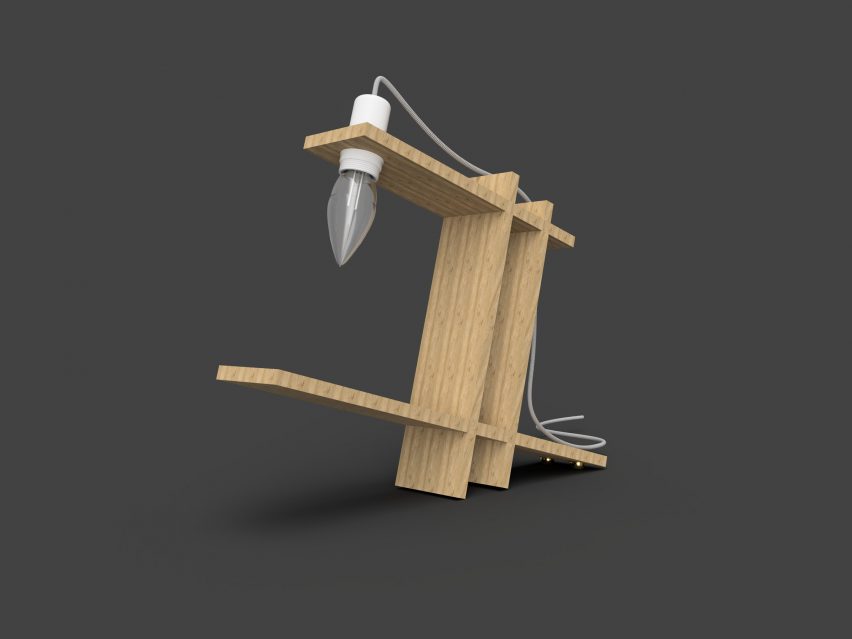
Flatlamp by Nicholas Read-Morgan
"This project aimed to create a desk lamp with the benefits of flat packing. Flat packing allows product packaging to be reduced in size, decreasing packaging waste and carbon emissions through transportation.
"Scandinavian design aesthetics inspired Flatlamp – it is a simple, minimalistic product that is easy to use. Softwood was chosen over plastic for its aesthetics as well as being more sustainable. The lamp is assembled using hidden slot joints, allowing for seamless assembly without the need for specialist tools."
Student: Nicholas Read-Morgan
Email: [email protected]
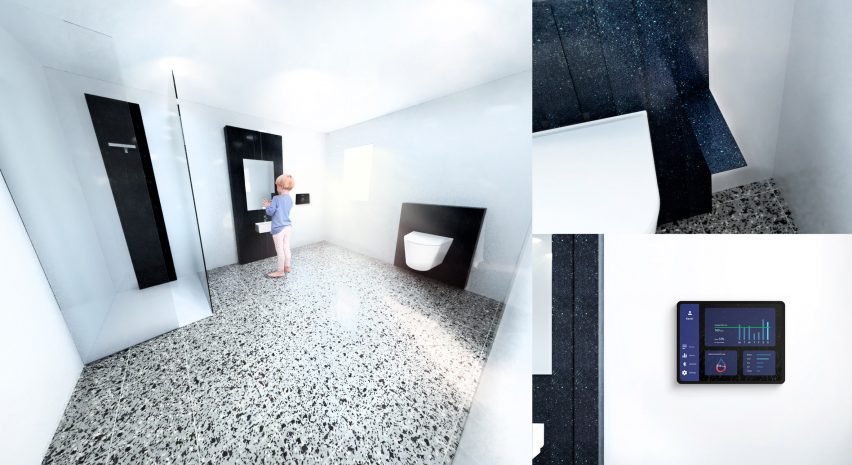
Familia by Nick James
"The bathroom is used by all – from toddlers through to elders. However, they are typically designed to work for the average adult, with everyone else expected to adapt. Existing 'hack' products often come with an unconsidered aesthetic and stigma attached.
"How can a bathroom adapt to meet users evolving needs? Familia allows household users to have their profile for height settings by utilising technology that can be changed as they age. Sleek, discreet handrails and shower seats are built into the module unit. There is a device that tracks personal water usage, including micro-interactions. This aims to encourage sustainable behaviour."
Student: Nick James
Email: [email protected]
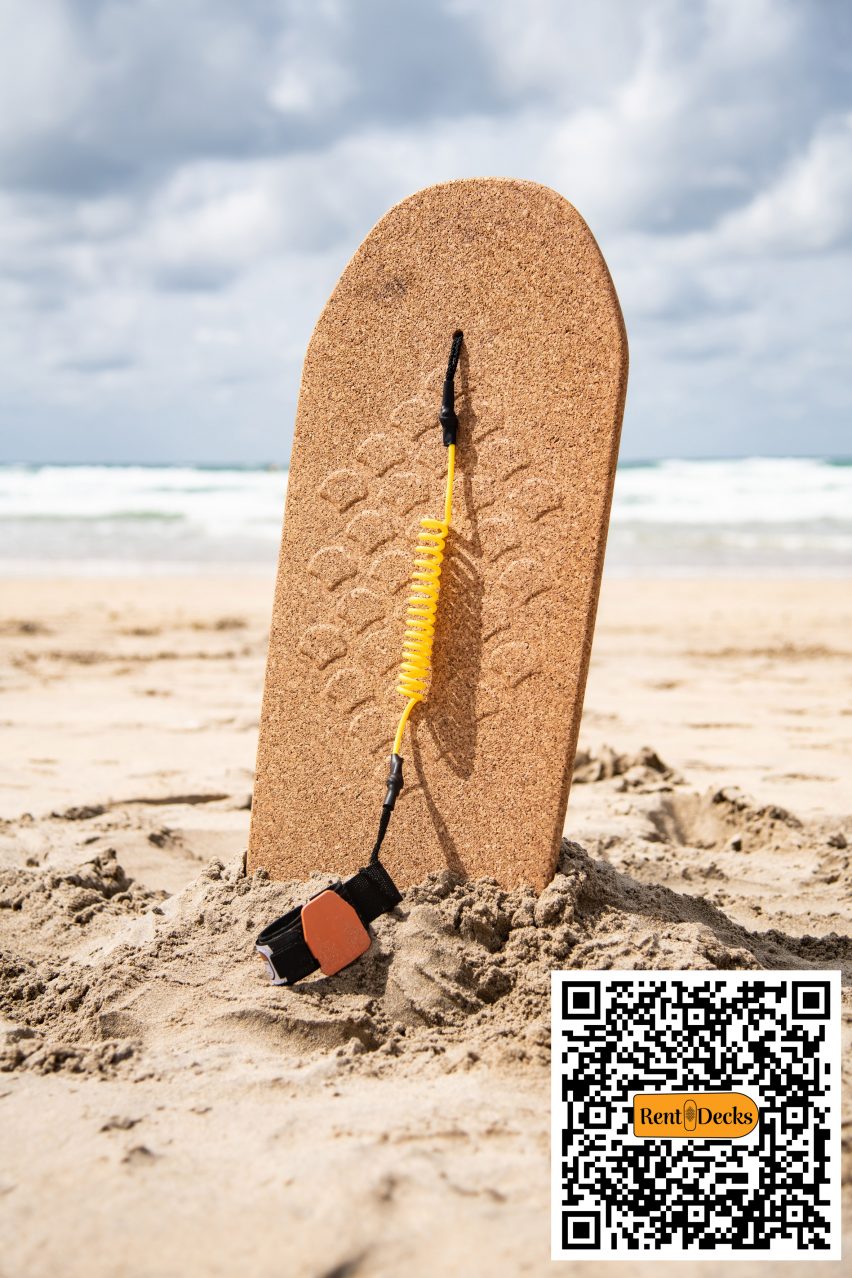
Rent Decks by Herbie Hodson
"Each summer, 14,000 bodyboards are thrown away in the UK. To reduce the amount of plastic waste on the beach, Rent Decks provides an alternative for tourists who want to go bodyboarding while on holiday, who would typically buy a cheap bodyboard made from polystyrene.
"Durable bodyboards made from cork and plywood can be rented for use at the beach, or booked with the visitors' accommodation, removing the need for polystyrene bodyboards and the plastic pollution they cause."
Student: Herbie Hodson
Email: [email protected]
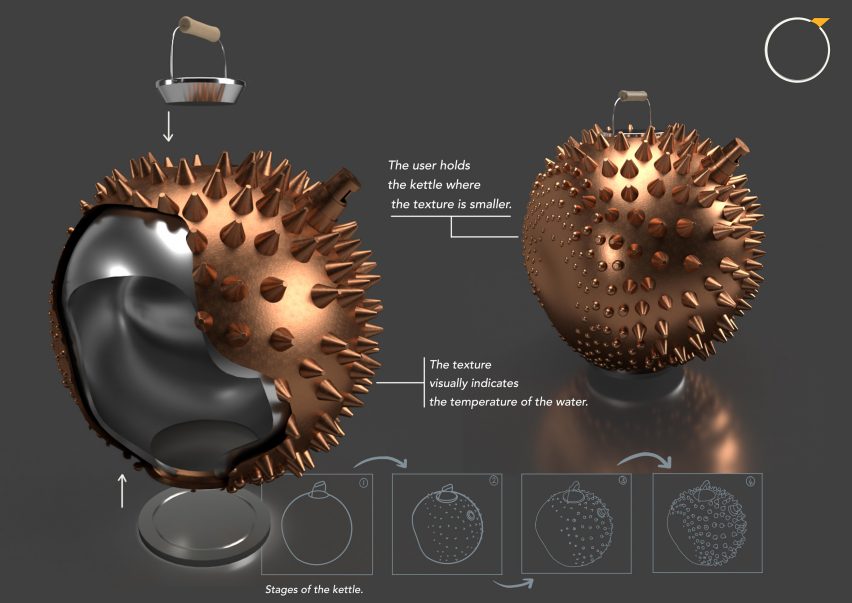
'Q' by Lydia Folkes-Skinner
"'Q' is a kettle concept designed to break convention. Inspired by 'emotional design' and sculpture, the kettle aims to provoke conflicting emotions with its changeable texture. Acting as a visual indication of the temperature of the water, the surface becomes fully pronounced when the water has reached boiling point.
"Spikes often indicate danger, yet the user is encouraged to pick up the kettle with their hands. The kettle consists of three layers: stainless steel, natural fibre insulation and copper. The insulation layer helps to reduce heat loss and keep the water hotter for longer."
Student: Lydia Folkes-Skinner
Email: [email protected]
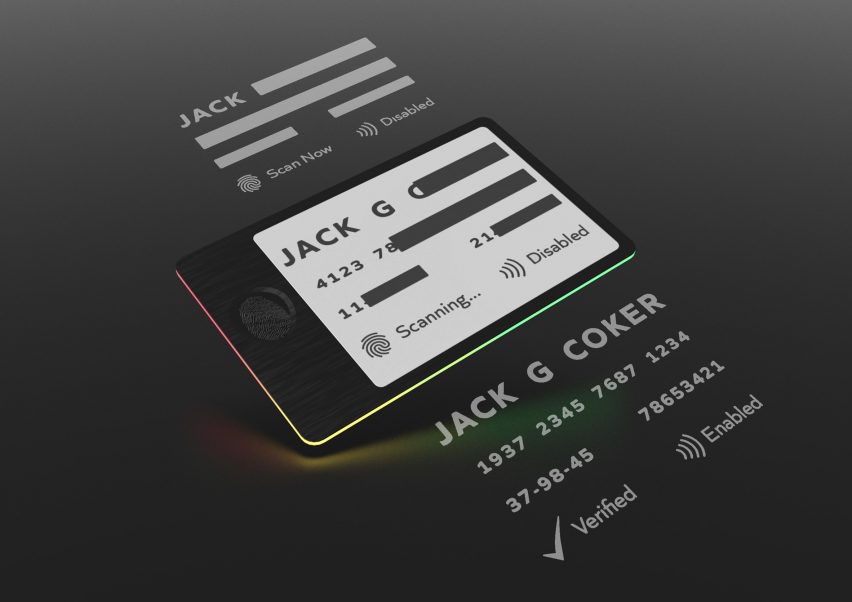
E-Ink Smart Card by Jack Coker
"In the UK, unplanned overconsumption is promoted by rising contactless payment limits and the loss of tactility and presence held by physical cash. The E-Ink Smart Card utilizes E-Ink technology to generate better user relationships with digital currencies.
"Solely powered by the tap of contactless payment, the paper-like display allows users to better interact with their funds after each transaction. Security was one of the examples of the creative explorations of the card's form. The addition of a fingerprint reader provides a step of authentication, displaying card details and activating contactless once scanned."
Student: Jack Coker
Email: [email protected]
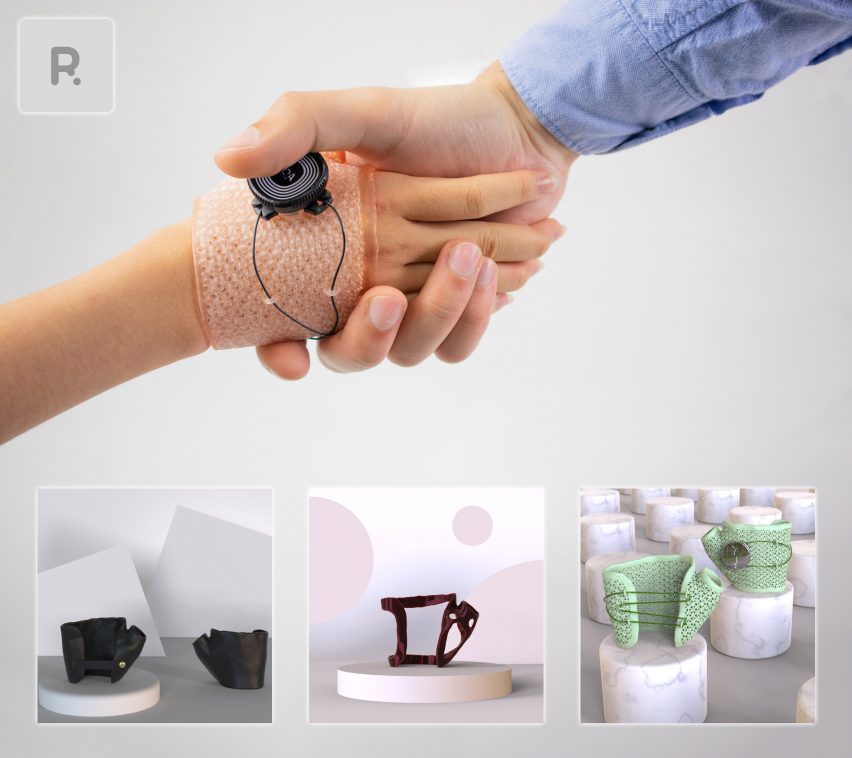
Revolutionise by Razvan-Cristian Brandiburg
"Revolutionise is an alternative solution to hand-crafted thumb splints made for people suffering from joint hypermobility caused by Ehlers-Danlos syndrome. 3D scanning and 3D printing technologies are used to produce mass customisable splints for patients, reducing waiting times and providing a broader choice in terms of support and aesthetics.
"The use of a BOA system allows control of the tension as well as a repairable and easily replaceable alternative to Velcro. The splint consists of a complex lattice structure, developed using topology CAD software, that can be adapted to fit any hand shape."
Student: Razvan-Cristian Brandiburg
Email: [email protected]
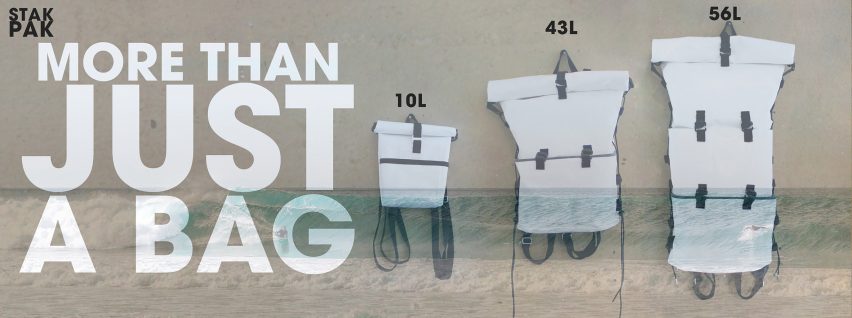
Stak Pak by Jasmine Arthur
"Stak Pak is a conceptual project exploring sustainability and modular design within fashion. Each Stak Pak diverts 5.6 kilogrammes of plastic waste by reusing PVC from lorries and cord made from plastic bottles. In addition, bluesign-approved aluminium hardware has been specified to extend the life of the product.
"Built to be the only bag you will ever need, its modular design enables you to swap units depending on what the day holds for you. Whether you need storage, reinforcement, or individual units for specific activities, Stak Pak gives you the freedom to do what you need to do."
Student: Jasmine Arthur
Email: [email protected]
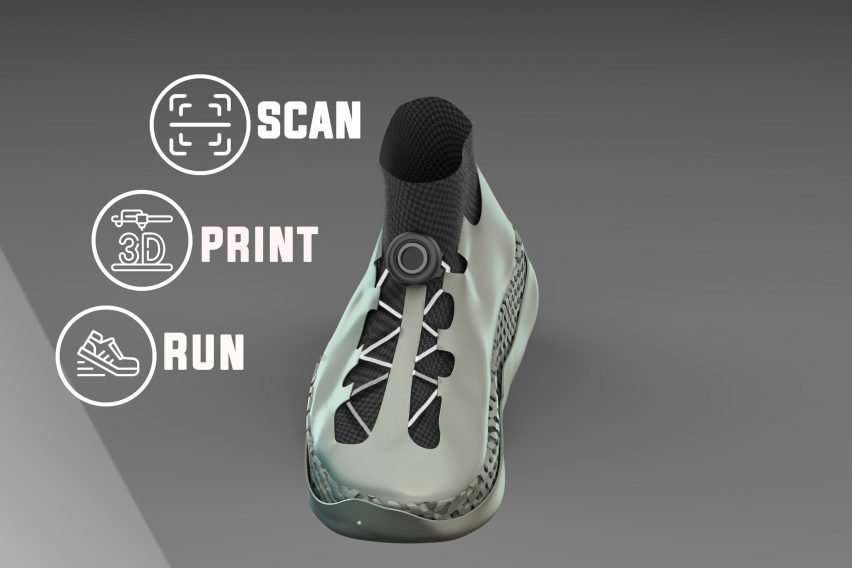
Scan - Print - Run by Farren Simpson
"According to the World Footwear Yearbook, 24 billion pairs of shoes were produced in 2020, but less than five per cent were recycled. In addition, 70 per cent of the most common foot ailments are caused by ill-fitting shoes. Both these issues are addressed in this project. Users visit a store where their feet are scanned and their movements analysed.
"An algorithm is used to design the shoe around their measurements and adjusts the cushioning to their needs. The shoes are then 3D printed locally. The custom shoes restore the user's foot health over time and provide better performance for the individual.
"When the shoes reach the end of their life, they are returned to the manufacturer where they're disassembled and turned into a new pair, creating a circular lifecycle."
Student: Farren Simpson
Email: [email protected]
Partnership content
This school show is a partnership between Dezeen and Falmouth University. Find out more about Dezeen partnership content here.